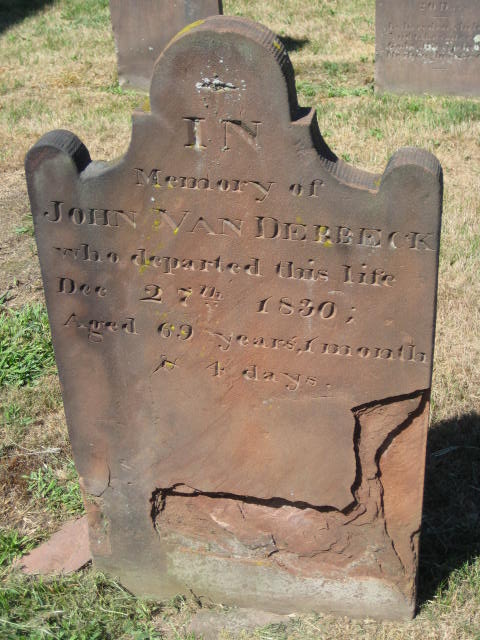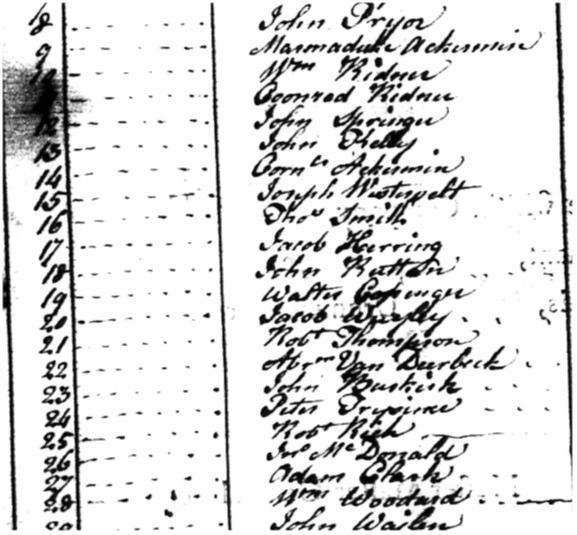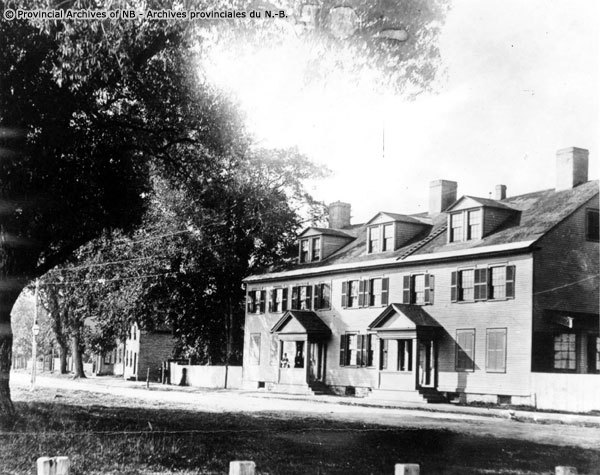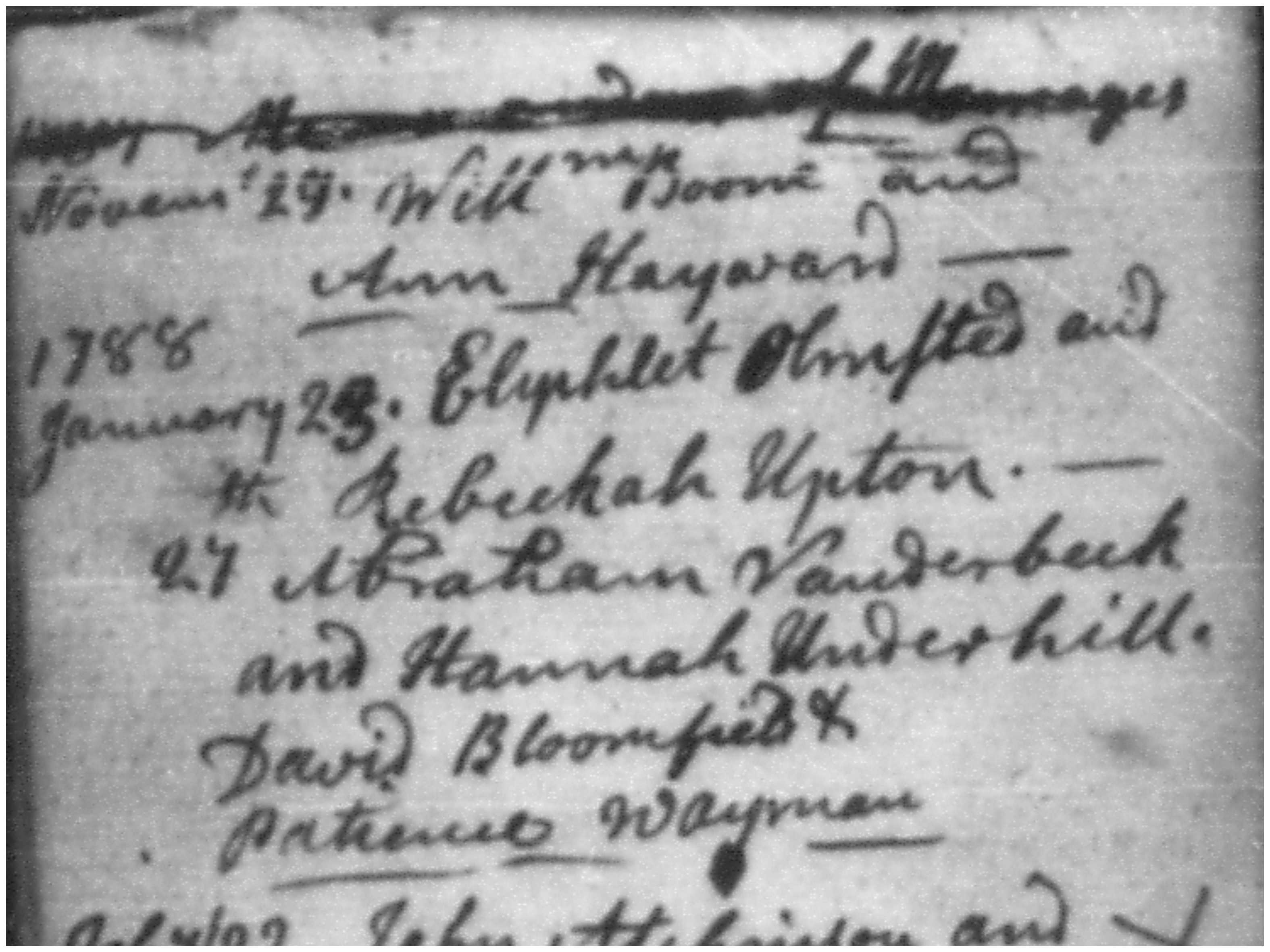- Submitted on
- 9 comments
“That at a very early period of the late Rebellion, being greatly persecuted by the Kings Enemies he was obliged to abandon his property and seek protection within the British Lines. That he joined the New Corps and cheerfully served during the whole war, exerting himself to the uttermost to prove useful, and was in the course of such service taken Prisoner, and while in Captivity treated with great inhumanity. That in consequence of his early exertion to promote the cause of his Sovereign and joining the British Army afterward, the whole of his property was seized, confiscated and sold . . .” This is a poignant excerpt from Abraham Vanderbeck’s loyalist claim submitted to the British government following the American Revolution and his resettlement to New Brunswick, Canada. I first became acquainted with Abraham Vanderbeck while engaged in a project on York County, New Brunswick loyalists. During the research process, I was able (with a little digging and serendipity) to search out his family roots and branches.

(Claims, American Loyalists: Series II (AO 13), v. 19)
Abraham, born in 1754, was a prosperous farmer from Hackensack, Bergen County, New Jersey where his family in North America stretched back to early Dutch immigrants. During the American Revolution, he was driven off his land by patriots for harbouring loyalist sympathies. His claims after the war for compensation for his lost property were largely unsuccessful, despite extensive paperwork and depositions from former neighbours.
The New Jersey Volunteers
An active military participant in the American Revolution, Abraham joined the 4th Battalion of the New Jersey Volunteers (also known as Skinner’s Brigade) soon after its formation in 1776 and served with the regiment throughout the war, rising through the ranks from private to sergeant. The theatre of war for much of the activity of the 4th occurred in Abraham’s home county of Bergen; thus, he would have been raiding in places, and perhaps against people, he knew well.
The winter of 1779/1780, which saw the 4th Battalion stationed at Staten Island, was extremely severe. Abraham was a veteran soldier by this point, and would have served as a leader for new recruits. In the spring, the regiment’s mission was to cut off Washington’s supply chain, followed by a foray led by Brigadier General Benedict Arnold to Connecticut. Arnold subsequently received land in Fredericton, New Brunswick near to Abraham’s plot on what is now Waterloo Row, making them likely acquaintances. Abraham had a dynamic military experience in the space of a few years due to his early enlistment and the many assignments of the 4th.

Leaving New Jersey
What we know about Abraham’s family in New Jersey is based on documentary leads; he was the son of Abraham Vanderbeck Senior (b. 1732 d. 1817) and the most likely candidate for his mother was Sarah Ackerman Vanderbeck (b. 1740 d. 1827). He had probably been a member of the Dutch Reformed Church in New Jersey, as his parents were buried at the Old Paramus Reformed Church Cemetery, which interestingly was used as headquarters by Washington. Old Paramus Cemetery also contains a grave of a possible brother, John Van Derbeck (b. 1761 d. 1830). It was difficult for families to maintain close tied during and after the war. Although Abraham Vanderbeck Senior also joined the British cause, he remained in New York after the war, while his son chose to migrate to New Brunswick.
Arriving at the St. John River on the ship Esther in October 1783, Abraham first received land with other members of the 3rd (the battalion had been renumbered by this point) New Jersey Volunteers in the Parish of Prince William, York County. Throughout the experience of war and migration, Abraham had a companion; his cousin Cornelius Ackerman, who was also a veteran of the 4th/ 3rd Battalion. After being comrades in arms, they later became successful business partners in Fredericton.

(Library and Archives Canada, British Military and Naval Records)
Life in Fredericton, New Brunswick
Having been in Fredericton for only a short amount of time, Abraham became a key figure in the society of the new town. He was one of the earliest innkeepers in Fredericton, a central role in most eighteenth and nineteenth century communities. He also took on various parish officer positions. Along with being the proprietor of The Golden Ball on Waterloo Row, he built the first inn on Queen Street with Cornelius in 1785.

(Image courtesy of the Provincial Archives of New Brunswick, PANB P5-882)
We have some evidence of the family life of Abraham: he married Hannah Underhill on January 27, 1788 at the Maugerville Anglican Church. Hannah was the daughter of Nathaniel Underhill and Rebecca Ward, loyalists of Westchester, New York who moved to Maugerville, New Brunswick in 1783. Abraham and Hannah had four known children: Abraham, Sarah, Nathaniel, and Maria. Abraham died in Fredericton at the approximate age of forty-seven and was buried “near the soldiers monument in the central grave-yard” (The Old Loyalist Burial Grounds) in the same year as his youngest child, Maria at the aged three; Nathaniel died in infancy as well.

(Parish of Maugerville (Anglican). Registers and Records: 1773-1896)
After having to move from the land where his family lived for generations and likely enduring conflict with friends and neighbours on the opposing side during the American Revolution, Abraham Vanderbeck experienced war first hand during his time with the New Jersey Volunteers through raids, attacks, and capture. He also made the decision to begin a completely new life and family in Fredericton, New Brunswick, and played a significant role in the development of the new community.
The Descendants in New Brunswick
Hannah re-married to John Astle in 1802 and moved to the Miramichi with Vanderbeck’s two living children, Abraham and Sarah. Vanderbecks appear in records from Northumberland County, New Brunswick due to this migration of Abraham Vanderbeck’s children. I came across a record concerning Abraham Vanderbeck the third while doing another project involving the Northumberland County Court Records. In 1806 and 1807, Abraham (the third) had put in two complaints to the court, one against his master and one on behalf of his sister, and in both cases the grievance was against his stepfather, John Astle.

(New Brunswick. Court of General Quarter Sessions of the Peace, Northumberland County. Minutes : 1789-1807.)
Traces of late Vanderbeck descendants can be discovered easily in newspaper records. For example, a death notice in the Union Advocate published in Newcastle, Northumberland County on December 25, 1895 appears for Abraham Vanderbeck. He was aged seventy years, “leaving a wife and family” in Millerton and was likely the fourth Abraham Vanderbeck of record, the great-grandson of the original namesake in New Jersey.
The Vanderbeck family traversed from an established life in Hackensack, New Jersey, through the American Revolution, to Fredericton, New Brunswick, then the Miramichi, demonstrating how the paths of family history are bent and shaped.
This post was drawn from a presentation made at a public lecture entitled "Thinking Historically about refugees: loyalists and maroons in the 18th century" hosted by The Royal Society of Canada Atlantic and The Loyalist Research Network, held at Government House, Fredericton, New Brunswick on April 1, 2017.
Leah Grandy holds a PhD in History and works as a Microforms Assistant at the Harriet Irving Library.

Comments Add comment
Abraham Vanderbeck
Vanderbeck Story Map
Hi, great to hear from you! Abraham Vanderbeck was actually one of the subjects of our recent loyalist story mapping project. You can view his story map here: https://unbgis.maps.arcgis.com/apps/MapJournal/index.html?appid=42ecada…
Abraham Vanderbeck
Vanderbecks
Hello! That you for your comment. It's great that a few of Abraham's descendants have found this blog post. We enjoyed researching his story. You can find his full, interactive story map here: https://unbgis.maps.arcgis.com/apps/MapJournal/index.html?appid=42ecada…
Vanderbeck Info
Vanderbecks
You are very welcome! It is great when we connect with loyalist descendants. You can get Abraham's full biography and story map through this link: https://loyalist.lib.unb.ca/story-maps
Family connection
Family Connection
Hello Michael,
Thank you for your comment. The Vanderbeck family Abraham derived from hailed form the Hackensack area of Bergen County, New Jersey, The were of Dutch origin, but had been in New Jersey for several generations before the American Revolution. We did not trace Abraham Vanderbeck's descendants or family tree as this project was concentrated on loyalist biography, but perhaps one of our readers will see your message and assist.
Family connection
Add new comment Comments